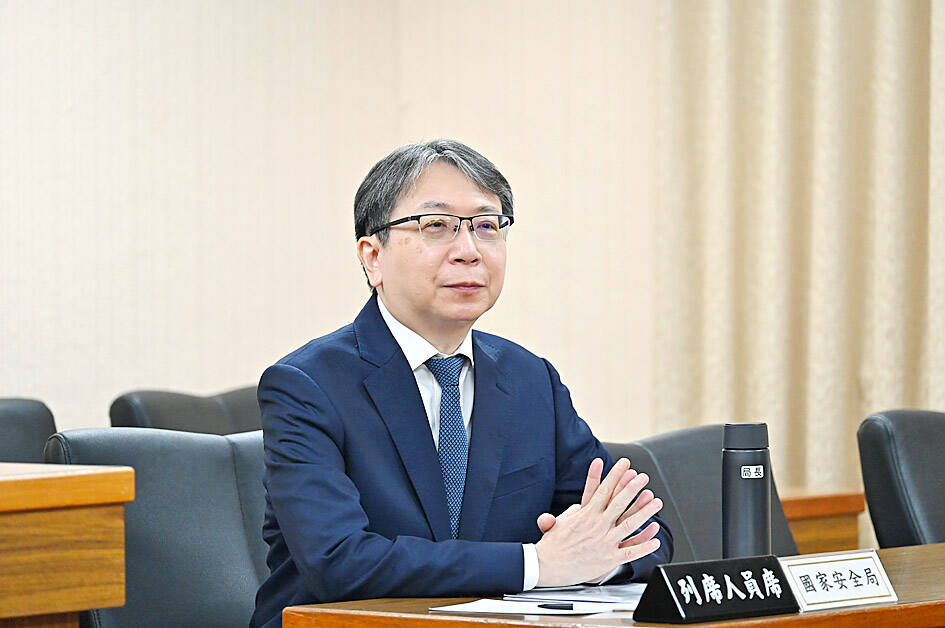The National Security Bureau (NSB) identifies up to 30,000 online posts containing false information every week, sending the most notable items to the National Security Council to review, it said yesterday.
At a hearing of the legislature’s Foreign and National Defense Committee, Chinese Nationalist Party (KMT) Legislator Hsu Chiao-hsin (徐巧芯) asked NSB Director-General Tsai Ming-yen (蔡明彥) how the bureau addresses false information online.
As an example, Hsu asked about a rumor circulating online in January that then-vice presidential candidate Hsiao Bi-khim (蕭美琴) had a secret boyfriend.

Photo:Chien-jun, Taipei Times
Tsai said that NSB staff and automated systems keep records of controversial content, including the rumor about Hsiao.
The agency has collected about 1.3 million controversial posts since last year, from which it has identified 20,000 to 30,000 posts containing false information every week, he said.
After fact-checking, it reports about 5,000 to 6,000 posts every week to the council and Executive Yuan, which then decide whether and how to respond, he added.
Pressed about how the bureau handles false claims, Tsai said that its role is simply to collect and report, and it is the responsibility of other agencies to respond.
In other security news, Taiwan has raised the alarm about the growing risks Taiwanese could face when visiting China, pointing to an expanded state secrets law that took effect yesterday.
Chinese lawmakers in February passed the revised Law on Guarding State Secrets, expanding the definition of such sensitive information to include a new category known as “work secrets,” state-run Xinhua news agency reported.
For Taiwanese, the expanded law means the risk of visiting China is likely to “increase significantly,” the Mainland Affairs Council said in a statement on Tuesday.
Under the updated law, the “work secrets” category is defined as information that is “not state secrets, but will cause certain adverse effects if leaked,” the council said.
The expanded legislation was “highly vague and may cause people to break the law at any time,” it added.
At the time of the law’s passage, Xinhua said the legislation stressed “the importance of upholding the CCP’s [Chinese Communist Party’s] leadership over work to guard state secrets.”
The council criticized Beijing for “continuously using legislations” to strictly monitor overseas visitors to China, saying that cases of “fabricated crimes” being leveled against Taiwanese and foreigners “are not uncommon.”
“We would like to once again remind the public to refrain from going to China for the time being unless necessary,” it said.
Among the most high-profile Taiwanese arrested in China was democracy advocate Lee Ming-che (李明哲) in 2017. He was jailed for five years on a national security conviction and released in 2022.
Last year, a Taiwanese man who is vice chair of a minor political party that advocates for Taiwanese independence was arrested in China and charged with “secession.”

Taipei has once again made it to the top 100 in Oxford Economics’ Global Cities Index 2025 report, moving up five places from last year to 60. The annual index, which was published last month, evaluated 1,000 of the most populated metropolises based on five indices — economics, human capital, quality of life, environment and governance. New York maintained its top spot this year, placing first in the economics index thanks to the strength of its vibrant financial industry and economic stability. Taipei ranked 263rd in economics, 44th in human capital, 15th in quality of life, 284th for environment and 75th in governance,

The Sports Administration yesterday demanded an apology from the national table tennis association for barring 17-year-old Yeh Yi-tian (葉伊恬) from competing in the upcoming World Table Tennis (WTT) United States Smash tournament in Las Vegas this July. The sports agency said in a statement that the Chinese Taipei Table Tennis Association (CTTTA) must explain to the public why it withdrew Yeh from the WTT tournament in Las Vegas. The sports agency said it contacted the association to express its disapproval of the decision-making process after receiving a complaint from Yeh’s coach, Chuang

Control Yuan Secretary-General Lee Chun-yi (李俊俋) tendered his resignation last night, admitting that he had misused a government vehicle, as reported by media. His resignation was immediately accepted by the Control Yuan. In a statement explaining why he had resigned, Lee apologized for using a Control Yuan vehicle to transport his dog to a pet grooming salon on May 20. The issue first came to light late last month, when TVBS News reported that Lee had instructed his driver to take the dog to the salon. The news channel broadcast photos that it said were taken by an unnamed whistle-blower, which purportedly showed the

A former officer in China’s People’s Liberation Army (PLA) who witnessed the aftermath of the 1989 Tiananmen Square massacre has warned that Taiwan could face a similar fate if China attempts to unify the country by force. Li Xiaoming (李曉明), who was deployed to Beijing as a junior officer during the crackdown, said Taiwanese people should study the massacre carefully, because it offers a glimpse of what Beijing is willing to do to suppress dissent. “What happened in Tiananmen Square could happen in Taiwan too,” Li told CNA in a May 22 interview, ahead of the massacre’s 36th anniversary. “If Taiwanese students or